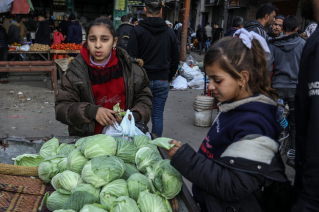On October 7, 2023, Hamas launched a terrorist attack on Israel that killed 1,200 people and took 240 women, children, and men hostage. Evidence of Hamas’ brutal use of violence and rape as a weapon of war against women and girls in Israel is incontrovertible. Bodies are still being identified.
The ensuing war in Gaza has killed more than 29,000 Palestinians. Approximately 70 percent—more than 18,000—are women and children. Out of 2.2 million people in Gaza, 1.7 million, including nearly 1 million women, are internally displaced and currently living in abysmal conditions.
A UNICEF spokesperson, speaking about her experience in Gaza, captured the horror of this conflict. “Seeing newborn babies suffer while some mothers bleed to death [in Gaza] should keep us all awake at night. Knowing two very young Israeli children abducted on 7 October have still not been released should also keep us awake.”
In Gaza, women and children are suffering disproportionately and account for most of the casualties in the crossfire and bombing. Hospitals have been destroyed and the healthcare system has mostly collapsed. This has been particularly devastating for women’s health. With maternity units closed, women must travel, risking their safety, to find care. Of the estimated 5,500 women who are expected to give birth in Gaza in the next month, 840 are likely to experience pregnancy- or birth-related complications. Gaza has one of the highest birthrates in the region, and around 180 women give birth each day, many with little or no medical help, sometimes in overcrowded shelters, public bathrooms, and tents, with life-threatening risks.
“Mothers face unimaginable challenges in accessing adequate medical care, nutrition, and protection before, during, and after giving birth,” said the spokesperson for UNICEF. “Becoming a mother should be a time for celebration. In Gaza, it’s another child delivered into hell.” UNICEF has been able to deliver milk formula and supplements for mothers too weak to breastfeed, along with some medical supplies, but much more is needed.
The institutions, systems, and community cohesion in Gaza that normally support girls’ development, protect them from violence, and uphold their human rights are crumbling. In war, family and community structures break down, while traditional and social norms disintegrate, affecting girls in unique and devastating ways. Family members, caregivers, and neighbors normally form a web of support for families by providing childcare, eldercare, and other support. These connections are extremely difficult to rebuild and without them, the future for the next generation in Gaza is bleak.
Many international donors are freezing development funding for Palestinian civil society organizations, creating a considerable barrier to the delivery of basic services for women and girls. Local women-led organizations, which are already underfunded, are particularly affected and at risk of having to cease operating due to the inability to pay their staff and utilities.
There are ways the international community can help. International governments must fully fund the United Nations’ 2023 Flash Appeal for humanitarian aid for Gaza and the West Bank and increase funding for national NGOs, particularly women-led local civil society organizations.
International governments must reverse recent decisions to withhold funds from the United Nations Relief and Works Agency for Palestine Refugees in the Near East (UNRWA). While allegations that some UNRWA staff were involved in the Hamas attack on Israel must be investigated and anyone involved must be held accountable, UNRWA is the main provider of food, non-food items such as mattresses, blankets, and diapers, and healthcare. It maintains wells and sanitation. Abruptly cutting funding from UNRWA without any functioning alternative in place would make the dire situation in Gaza infinitely worse.
All parties to the conflict must respect international humanitarian law and cooperate with the UN Human Rights Council’s Independent International Commission of Inquiry on the Occupied Palestinian Territory, including East Jerusalem and Israel. This is an investigation of possible international crimes and violations of international human rights law committed in Israel, Gaza, and the West Bank on and since October 7, including credible allegations of gender-based crimes, with an emphasis on murder and hostage-taking, rape, and other forms of sexual violence.
Finally, the international community must ensure that the rights of diverse Palestinian women and other marginalized groups, including human rights defenders, peace activists, and journalists, are protected and upheld in line with international law, and that Palestinian women are able to fully contribute to any de-escalation, ceasefire, or other efforts to negotiate peace. Women in Gaza should be at the forefront of responding to this crisis and, hopefully soon, rebuilding.


